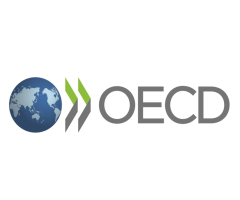The Organisation for Economic Co-operation and Development (OECD) was established in 1961 as a forum for cooperation among governments in matters of peace and development. It has 36 member countries and is headquartered in Paris, France. The OECD creates standards for a wide range of social, economic, and environmental issues. OECD standards, though not binding, are referenced in many global and national processes.
ARTIFICIAL INTELLIGENCE
The OECD convenes international dialogue, enables the adoption of international standards for the responsible stewardship of trustworthy AI, and informs national public policy-making processes related to AI.
OECD discussions on the benefits and challenges brought by AI took off with the Technology Foresight Forum on AI (held in 2016) and the AI: Intelligent machines, smart policies conference (2017). In 2018, the OECD’s Committee on Digital Economy Policy created a multistakeholder expert group to provide guidance in developing principles for trustworthy AI. The group’s work formed the basis for the OECD Principles on AI, aimed at promoting responsible stewardship of trustworthy AI. The principles are embedded in the OECD Council Recommendation on AI (adopted in May 2019), which also includes recommendations for national policies and international cooperation towards trustworthy AI. Although they are not binding, the OECD AI Principles have been endorsed by over 40 OECD and non-OECD member countries (as of March 2020).
The AI principles follow earlier OECD privacy guidelines. Adopted in 1980, the framework was revised in 2013 to respond to the data economy and incorporate guidelines on transborder data flows. In 2020, the OECD was scoping among member countries and experts for the development of practical recommendations for the implementation of the guidelines in the current digital economy.
In addition to recommendations, the OECD is also issuing publications and policy notes exploring various dimensions of AI. Examples include Artificial intelligence in society (which explores AI-related public policy consideration), Hello, world: Artificial intelligence and its use in the public sector (aimed to assist policymakers in exploring AI), and Putting faces to the jobs at risk of automation (a policy brief on the future of work).
In 2020, the OECD launched an AI policy observatory as a ‘platform to share and shape public policies for responsible, trustworthy and beneficial AI’.
In addition to supporting governments in their efforts to address the economic and social impacts of AI technologies, the OECD also cooperates with other stakeholders (e.g. EU, G20, private companies, etc.) in identifying good practices, principles, and guidelines for trustworthy AI.
BLOCKCHAIN
In 2018, the OECD launched a Global Blockchain Policy Forum, as a platform for international discussions on the policy implications of blockchain and its applications. Organised annually, the forum also explores emerging trends in the blockchain industry and looks at how public policies can support innovation and trustworthy use of blockchain applications.
The OECD has also established a Blockchain Policy Centre to support governments in addressing the challenges raised by blockchain, and seizing the opportunities the technology offers for achieving public policy objectives. In achieving its mission, the centre conducts policy research; develops guidance, recommendations, and standards regarding the use of blockchain; provides capacity building to ensure that policymakers understand the benefits and challenges of blockchain; and, fosters cooperation with various stakeholders on issues related to policy implications of blockchain.
In January 2020, the OECD formed the Blockchain Expert Policy Advisory Board to provide policy advice on the organisation’s work on blockchain and other distributed ledger technologies. The group is also expected to develop a draft international framework of blockchain policy principles.
The organisation publishes papers and reports on multiple blockchain-related issues, such as the implications of the tokenisation of assets for financial markets, blockchain and competition policy, and the use of blockchain technology in the public sector.
ARTIFICIAL INTELLIGENCE
- Promotes responsible, trustworthy, and beneficial AI that respects human rights and democractic values
BLOCKCHAIN
- Works towards an international framework of blockchain policy principles to help governments and other stakeholders take advantage of the opportunities offered by blockchain, while also addressing the risks.
